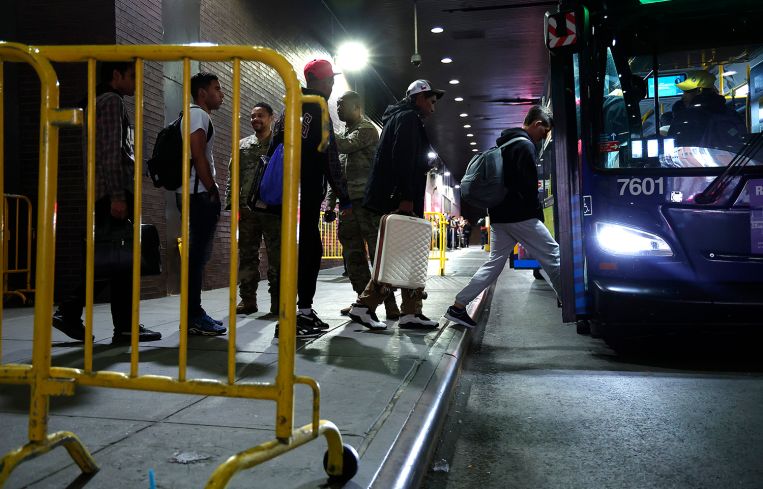NYC Overspending by 237% on Some No-Bid Migrant Shelter Contracts, Comptroller Says
By Rebecca Baird-Remba February 27, 2024 6:32 pm
reprints
The city has paid some emergency contractors for migrant shelters and services as much as 237 percent more than their counterparts that went through a competitive bidding process, according to a new report from City Comptroller Brad Lander’s office.
The comptroller’s office found the city spent $5.7 billion on 340 contracts for asylum seeker services across 14 different agencies. Most were procured using emergency rules, meaning the city suspended its traditional bidding process for a contract to award it more quickly.
Across the board, the city appears to be spending significantly more on no-bid shelter and emergency services contracts than for ones that went through the traditional, competitive bidding process with stricter requirements.
“There was little, if any, evidence of coordination or planning between city agencies to evaluate and monitor prices of services or to ensure commensurate pricing across city agencies,” Lander’s office noted. “The city agencies charged with serving asylum seekers entered into these costly, no-bid contracts at the same time that they are facing budget cuts and hiring freezes.”
In one instance flagged by the comptroller, New York City Emergency Management (NYCEM) — the public agency that handles disaster planning — had a contract with emergency contractor SLSCO with hourly rates that were 237 percent higher than a similar contract secured by the city’s Department of Homeless Services with Essey Group. Both Essey and SLSCO operated migrant shelter sites. However, the Essey contract was the only one out of four analyzed by the comptroller’s office that was secured via a competitive bidding process with a city agency.
SLSCO is also billing the city $201 per hour for off-site shelter managers, which is double what Garner Environmental Services, another emergency contractor, charges the Department of Citywide Administrative Services for the same jobs, and four times what medical services provider DocGo charges, according to the comptroller’s office.
Similarly, the Department of Housing Preservation and Development had a COVID-19 testing contract with DocGo that cost 146 percent more than DHS’s contract with Essey for the same service. DocGo, which provides mobile medical testing, has come under intense scrutiny after receiving a $432 million no-bid contract from the city, which the comptroller’s office ultimately rejected. The contract runs from May 2023 to May 2024, according to the report.
New York Attorney General Letitia James has also been investigating DocGo for a slew of abuses, including tossing away 70,000 uneaten meals for migrants that cost the city nearly $800,000 in a three-week period, The New York Times reported in December.
New York City Health + Hospitals (H+H) — which handled a large number of asylum seeker services contracts over the past two years — paid Garner $117 per hour for security staff, while the city’s emergency management agency paid guards $79 per hour. The report noted that NYCEM negotiated its contract, while H+H did not. Similar pay differentials cropped up for many other roles, with huge variances in per-hour pay for the same jobs — including caseworkers, on-site supervisors, and support staff — in the three different contracts with Garner, DocGo and SLSCO.
In many cases, the city would have saved money by simply hiring its own staff to provide these services, Lander’s office argues. For example, at the Row Hotel in Times Square — where the city shelters 1,000 asylum seekers — SLSCO charged the city 2.5 times what it would have cost to use city employees to provide the same shelter services in 2022 and 2023, the report found. If the city had hired its own staff, it would have saved about $50 million annually at the Row Hotel, according to the comptroller’s office.
Spokespeople for SLSCO, Garner and DocGo didn’t immediately return requests for comment on the report.
During a press conference Tuesday, Mayor Eric Adams defended the practice of using emergency, no-bid procurement to secure asylum seeker services.
“It’s a combination of RFPs and emergency contracts to make these emergency decisions,” he said. “But if I need a security team at a certain location immediately … we have to go into an emergency contract to get them there. And then we’re going to do a 30 percent decrease in our asylum seeker spending, we’re now renegotiating these contracts. We’re finding the savings. We’re still in an emergency state, but we have an opportunity to sit down and renegotiate the contracts for food, for cleaning, for housing, for security.”
Adams has previously come under fire from Lander for his spending on the migrant crisis, with the comptroller restricting Adams’s emergency powers to enter into contracts with migrant service providers in December, the Times reported.
The report also landed just as Adams has instituted another round of tough budget cuts on city agencies, with a promise to cut the asylum seeker budget by 11 percent in 2024 and 20 percent in 2025, the city’s Independent Budget Office noted in a new analysis.
Rebecca Baird-Remba can be reached at rbairdremba@commercialobserver.com.



